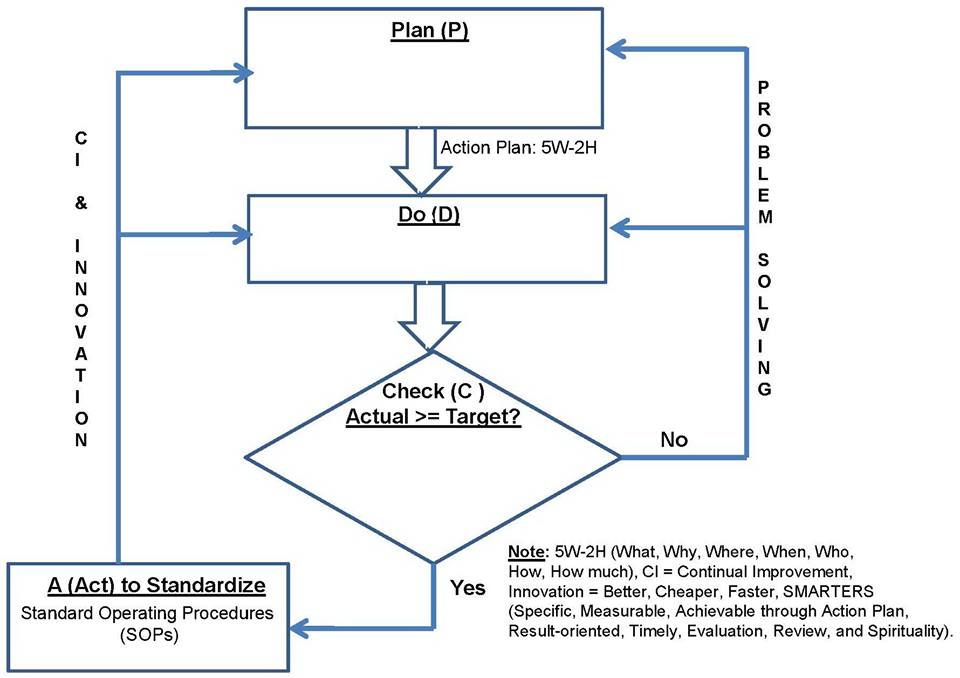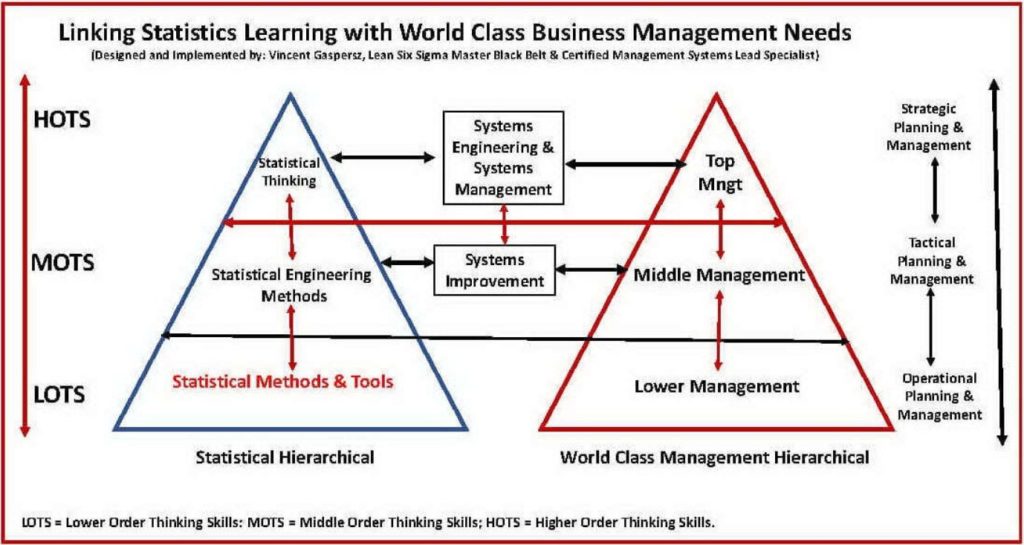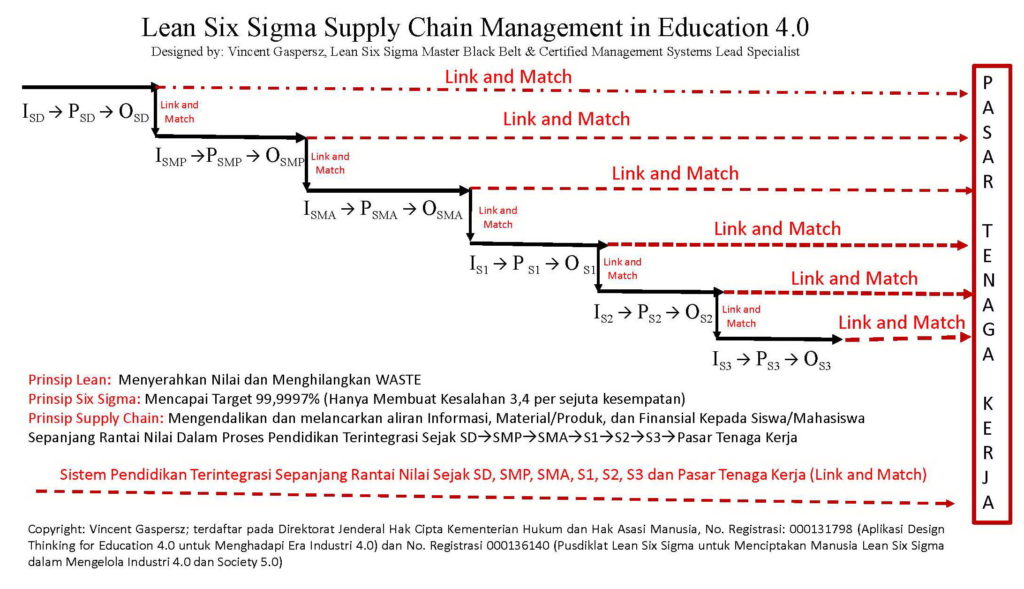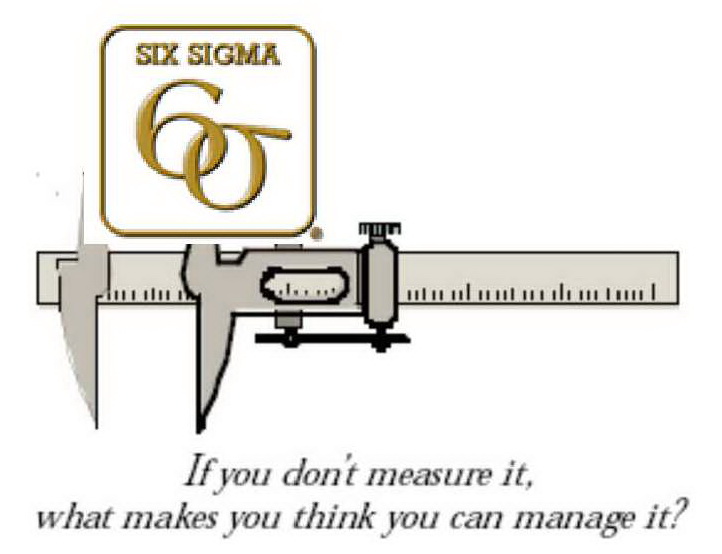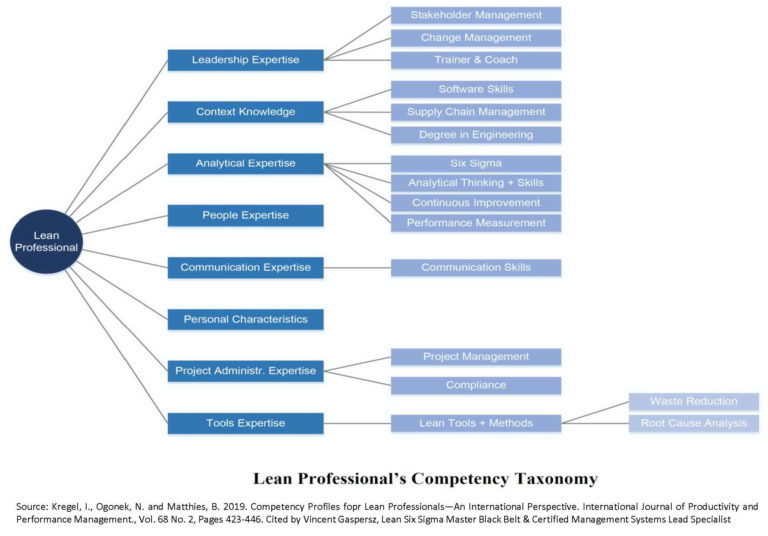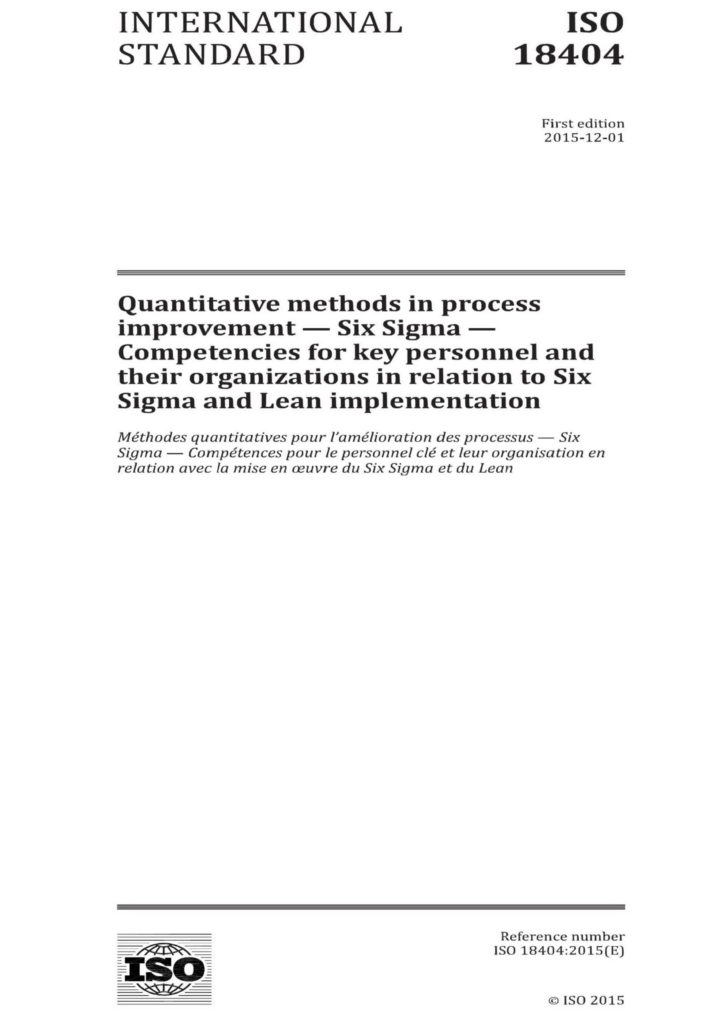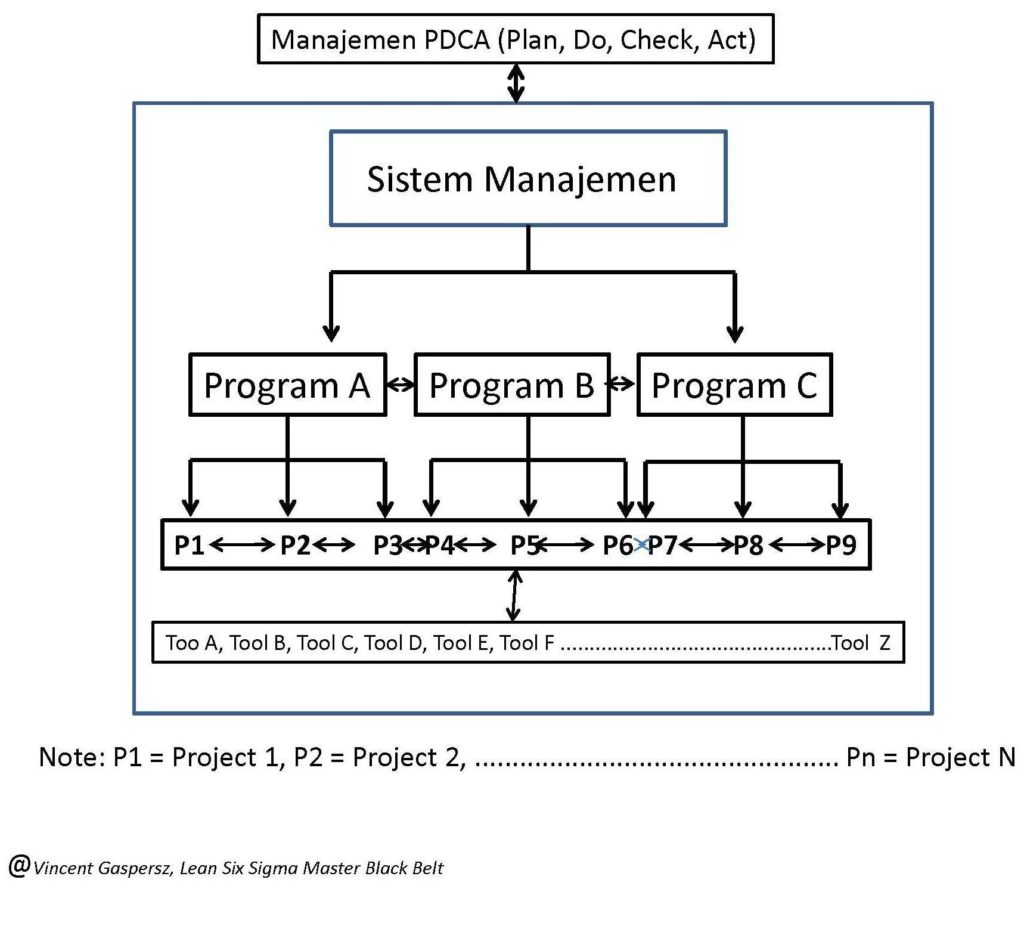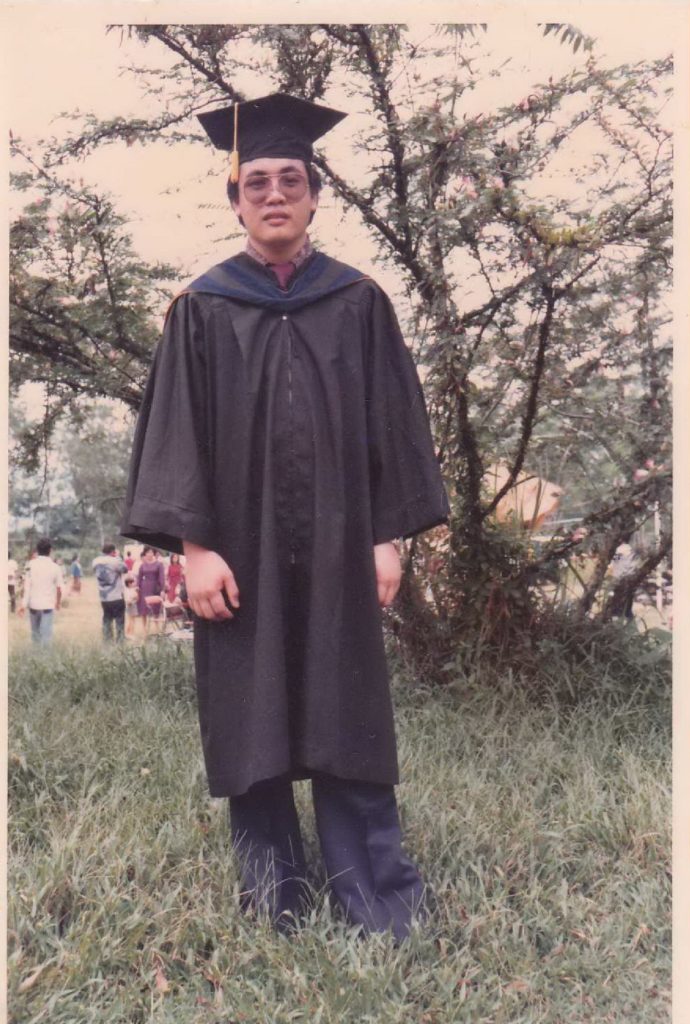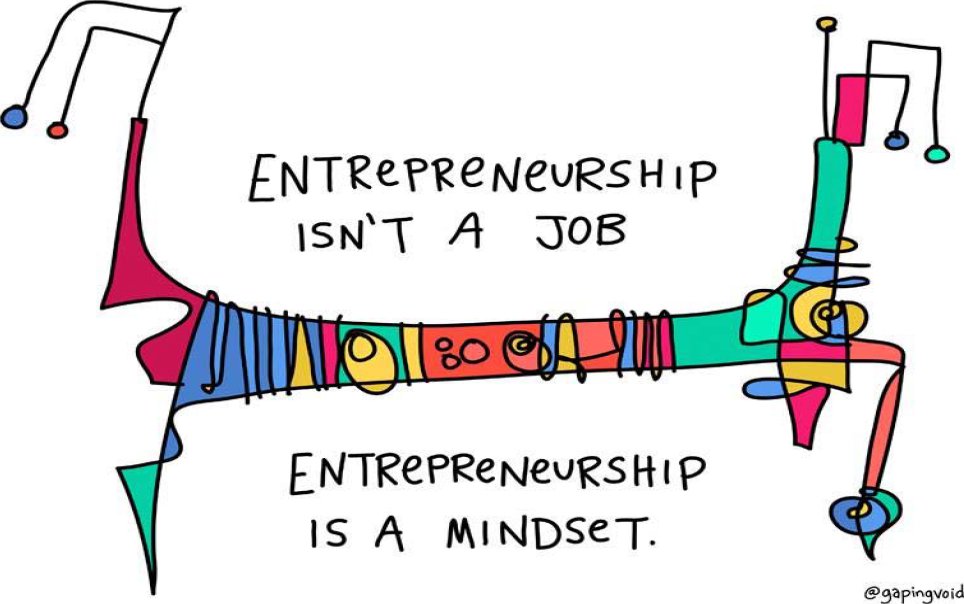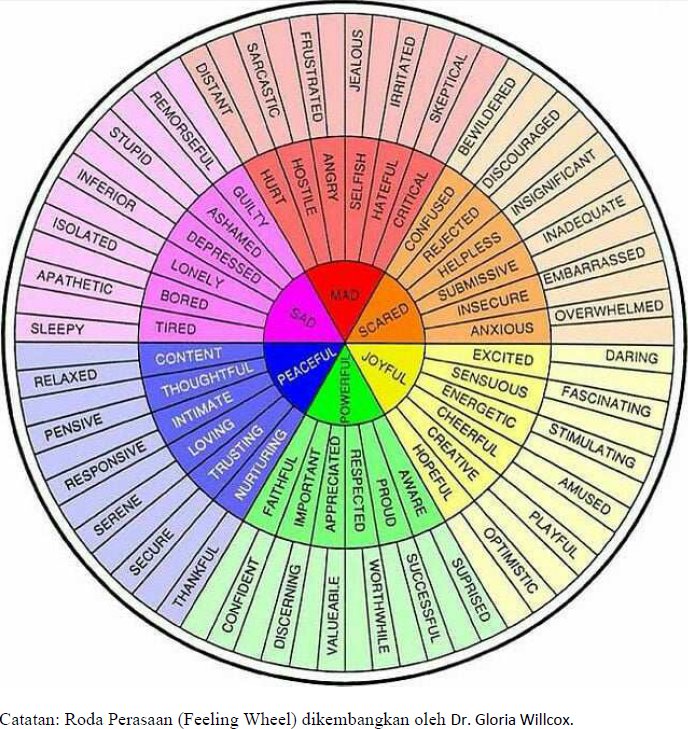-
Bahasa Indonesia
-
English
Jika pada tulisan saya sebelumnya, saya TELAH mengungkapkan mengapa saya GAGAL mengikuti ujian ASQ dan APICS sampai TIGA kali berturut-turut, kemudian mencoba mencari sumber-sumber ke-GAGAL-an untuk Problem Solving, maka tulisan berikut ini adalah perbaikan yang dilakukan agar saya berada pada jalur SUCCESS (Check: Actual >= Target) yang diterapkan dalam PDCA Approach itu.
Berikut adalah KUNCI SUCCESS apabila ingin LULUS ujian ASQ menggunakan PDCA Approach.
Perencanaan (Plan):
- Jangan terlalu percaya diri berlebihan, apapun latar belakang pendidikan, jabatan, atau hal-hal lain TIDAK berpengaruh pada SUCCESS. Menurut PDCA Approach, SUCCESS adalah perencanaan yang baik, di mana melalui perencanaan yang baik kita telah menuju SUCCESS 60%, sisanya 40% adalah melakukan ACTION PLAN secara benar dan konsisten. Jika terlalu percaya diri berlebihan seringkali membuat kita TIDAK berhati-hati dan lengah dalam menyiapkan diri, dan di sinilah awal dari ke-GAGAL-an itu dimulai.
- Membaca Body of Knowledge Secara Menyeluruh. Ini adalah langkah terpenting dalam perencanaan (Plan/P) sebelum kita memutuskan untuk mengambil ujian sertifikasi professional dari ASQ. Body of Knowledge disusun oleh suatu team (together everyone achieves more) komite yang terdiri dari para professional dalam bidang ilmu yang akan diuji dan mereka TELAH berpengalaman PRAKTEK berpuluh tahun dalam bidang yang terkait dengan Body of Knowledge (BoK). Informasi tentang BoK dapat didownload dari website di mana jenis sertifikasi professional itu akan diambil: http://asq.org/cert
- HARUS memiliki pengalaman kerja yang berkaitan dengan Body of Knowledge (BoK). Jika kita masih merasa kurang dalam pengalaman kerja, maka dapat dimintakan bantuan pembimbing yang TELAH berpengalaman kerja berkaitan dengan APLIKASI Body of Knowledge itu. Dosen di perguruan tinggi Indonesia yang TIDAK memiliki pengalaman PRAKTEK lapangan HARUS berbesar hati untuk bekerja sama dengan PRAKTISI (PRAKtek TIdak SulIt) yang TELAH berpengalaman puluhan tahun TANPA memandang gelar akademik dari PRAKTISI itu. Gelar AKADEMIK (S1, S2, S3) berbeda dengan gelar PROFESIONAL (CQIA, CMQ/OE) atau CSSYB, CSSGB, CSSBB, CSSMBB. Tentu saja seorang Master Black Belt memiliki KOMPETENSI (Praktek Implementasi Plus IPTEK) yang lebih tinggi dan lebih lama daripada seorang Black Belt, Green Belt, dan Yellow Belt. Dan hal ini TIDAK bisa dibandingkan dengan seorang Prof. Dr. sekalipun di dunia akademik. Masing-masing memiliki jalur yang berbeda. Tingkatan sertifikasi ASQ bisa dilihat dalam bagan terlampir. Mengapa saya pribadi yang TELAH memiliki ASQ CMQ/OE (Certified Manager of Quality/Organizational Excellence: Persyaratan ujian adalah minimum 10 tahun pengalaman PRAKTEK) tertinggi dalam jalur Manager HARUS RELA untuk mengikuti ujian ASQ CQIA (Certified Quality Improvement Associate: Persyaratan ujian HANYA 2 tahun PRAKTEK) bagi seorang pemula? Karena saya ingin membantu mereka para pemula dari lulusan perguruan tinggi di Indonesia agar SIAP memasuki dunia kerja sebagai Quality/Performance Improvement Leader dan TIDAK PERLU harus menapaki dari jenjang PALING BAWAH yaitu sekedar MT (Management Trainee). Di sinilah apabila perguruan tinggi Indonesia MAMPU berpikir STRATEGIK, maka PT itu akan menyiapkan para lulusannya untuk SIAP berkompetisi dalam pasar tenaga kerja nasional maupun internasional.

- HARUS memahami tingkat kognitif dari topik-topik dalam ASQ BoK, yaitu: Remember, Understand, Apply, Analyze, Evaluate, Create berdasarkan taksonomi Bloom seperti bagan terlampir. Sayang sekali bahwa dunia perguruan tinggi Indonesia HANYA memberikan bekal kepada para lulusannya sampai paling tinggi adalah Understanding, malahan kebanyakan dosen-dosen yang KURANG ber-KOMPETEN hanya mengajarkan pada level terendah yaitu: Remember! Sebagai misal, jika kita membaca kata “Apply” dalam ASQ BoK, maka itu berarti soal atau pertanyaan yang akan diajukan dalam ujian real ASQ adalah berkaitan dengan kasus-kasus spesifik. Untuk menjawab pertanyaan semacam ini (Apply) kita HARUS memiliki pemahaman (Understanding) yang mendalam dan mengetahui pada saat kapan dan bagaimana kita menggunakan ide-ide, prosedur-prosedur, metode-metode, formula-formula, konsep-konsep, dan alat-alat dalam konteks contoh kasus dalam ujian ASQ itu. Itu alasan mengapa sistem kuliah berbasis KASUS lebih TEPAT bagi mahasiswa agar melatih mereka menerapkan (Apply) konsep-konsep, formula-formula, alat-alat, dll yang diajarkan DARIPADA sekedar dosen mengemukakan materi pembelajaran melalui berbicara atau presentasi saja. Demikian pula pada tahapan yang lebih tinggi seperti: Analyze, Evaluate, Create, membutuhkan pemahaman konsep-konsep yang mendalam disertai cara berpikir KREATIF dan STRATEGIK. Bagan terlampir menunjukkan tingkatan pemikiran yang dapat dijadikan sebagai referensi. Sebagai misal, jika kita membaca ASQ BoK dan pada topik tertentu ada tertulis “Analyze” maka kita mengharapkan bahwa akan ada soal atau pertanyaan yang membutuhkan keterampilan kita untuk membagi informasi menjadi bagian-bagian, mengidentifikasi hubungan dan pola-pola dari organisasi, dan terutama menghasilkan informasi yang berguna dari situasi tertentu atau sekumpulan data tertentu. Keterampilan berpikir mengikuti level dari taksonomi Bloom ini TIDAK dipahami oleh mayoritas mahasiswa dan lulusan PT Indonesia, sebagai konsekuensi dari dosen-dosen yang TIDAK mempraktekkannya (tidak menggunakan) ketika memberikan kuliah-kuliah.

- HARUS menggunakan referensi yang TEPAT sesuai dengan ASQ BoK. Informasi tentang referensi dapat dilihat dalam website tentang Sertifikasi Profesional dari ASQ yang ingin diambil: http://asq.org/cert
- HARUS menggunakan Exam CD yang bisa dibeli dari Quality Council of Indiana atau sumber lain terpercaya. Saya SELALU membeli bahan-bahan ujian termasuk Exam CD dari Quality Council of Indiana yang berisi 1.000 soal. INGAT: Exam CD HANYA untuk berlatih BUKAN untuk menghafal soal-soal, KARENA yang terpenting adalah memahami KONSEP dan MENGAPA jawaban tertentu salah atau benar. Mahasiswa Indonesia TIDAK terbiasa bertanya Mengapa? Karena lebih berorientasi pada HASIL akhir bukan pada PROSES, akibatnya TIDAK terjadi peningkatan KREATIVITAS dalam berpikir. Sejak SD anak-anak Indonesia TELAH diharuskan untuk menghafal dan TIDAK tahu mengapa hasilnya demikian? Hal ini berbeda dengan cara belajar anak-anak di negara-negara maju yang lebih berorientasi pada PROSES. Contoh sederhana: anak-anak diajarkan untuk menghafal: 5 x 5 = 25. Ketika ditanya Mengapa 5 x 5 = 25? Mereka tidak bisa menjawab Karena TIDAK belajar KONSEP. Padahal untuk perkalian menggunakan konsep penjumlahan, sehingga apabila ditanyakan mengapa 5 x 5 = 25, maka anak-anak di luar negeri akan menjawab bahwa penjumlahan bilangan 5 sebanyak 5 kali, yaitu: 5 + 5 + 5 + 5 + 5 = 25. Ketika belajar ASQ Exam melalui CD Ujian, maka kita HARUS mengetahui dan bertanya: Mengapa jawaban yang BENAR adalah A dan BUKAN B, C, atau D?. Lalu Apa itu arti jawaban B, C, atau D, jika jawaban-jawaban itu SALAH? Dengan demikian jika ada 1.000 soal yang berbeda, maka apabila dipahami dengan baik kita akan memperoleh ribuan (minimum 2.000 – 3.000) item pengetahuan baru. Di samping itu Exam CD akan memetakan kekuatan dan kelemahan kita pada topik-topik tertentu dalam ASQ BoK, sehingga apabila nilai persentase MASIH sekitar 80-an%, maka kita HARUS meningkatkan menjadi minimum 90%. Peningkatan nilai BUKAN berdasarkan pengulangan soal-soal yang sama, TETAPI pemahaman terhadap jawaban dari soal-soal yang berbeda. Intinya kita HARUS mengetahui kekuatan dan kelemahan kita tentang ASQ BoK melalui Exam CD kemudian berusaha meningkatkan semua topik dalam BoK sampai minimum 90-an%.

- HARUS memahami sistem penilaian ke-LULUS-an dari ujian ASQ adalah berdasarkan CUTOFF SCORE seperti dalam bagan terlampir. Kita tidak perlu TAHU bagaimana proses penilaian itu ASALKAN memahami bahwa ujian ASQ adalah berdasarkan ujian BoK. Jika dalam ASQ BoK ada 4 topik utama dan ditetapkan bahwa minimum ke-LULUS-an adalah 75% dari BoK, maka hal itu berarti untuk ke-4 topik ASQ BoK itu kita HARUS memperoleh nilai MINIMUM 75%. Sehingga jika katakanlah kita memperoleh skor TOPIK 1 adalah 90%, skor TOPIK 2 adalah 85%, skor TOPIK 3 = 60%, dan skor TOPIK 4 adalah 100%, maka kita dinyatakan TIDAK KOMPETEN dalam TOPIK 3 sehingga dinyatakan TIDAK LULUS. Berarti ke-4 TOPIK itu HARUS memperoleh nilai MINIMUM 75% (di atas 75% pada TOPIK tertentu tetapi di bawah 75% pada TOPIK lain, memberikan KONSEKUENSI TIDAK LULUS). Itulah mengapa agar AMAN, saya menggunakan skor MINIMUM 90% ketika berlatih ujian simulasi menggunakan Exam CD agar memiliki peluang 99% LULUS (tambahan 1% adalah ber-DOA: Depend On Allah).
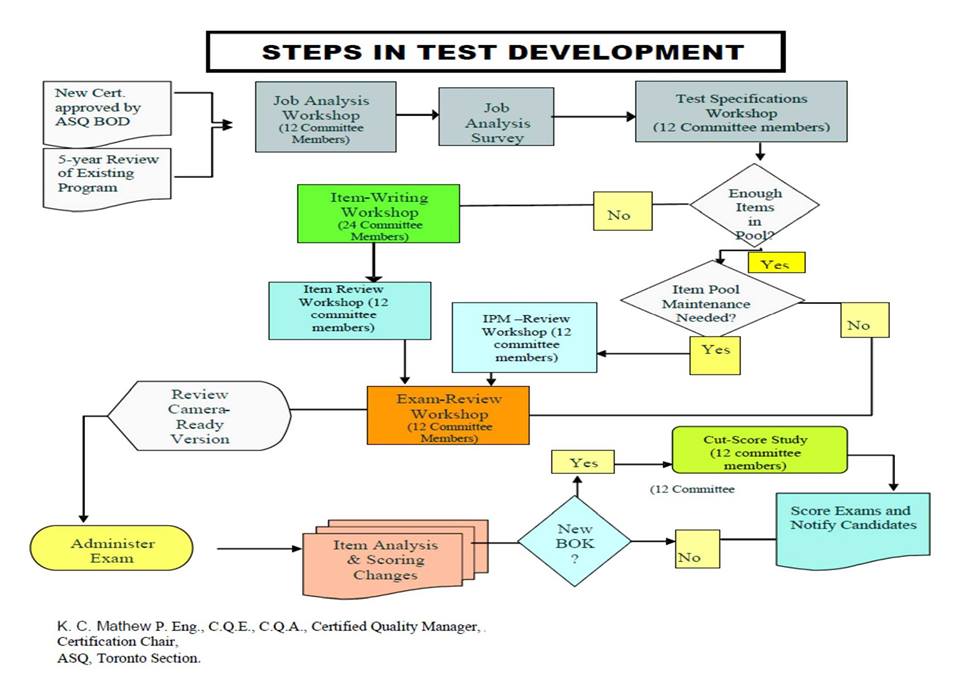
- HARUS mengorganisasikan buku REFERENSI utama dengan post-it agar mudah mengetahui letak setiap topik ASQ BoK. Post-it HANYA boleh menulis topik bukan catatan lain Karena meskipun sifat ujian ASQ adalah OPEN BOOK EXAM, DILARANG membawa catatan yang berisi latihan soal-soal, dll dan hal ini akan diperiksa secara KETAT, juga ujian dimonitor oleh kamera CCTV sehingga akan terekam kamera jika kita melanggar peraturan ASQ.
Planning (P) yang panjang lebar di atas akan memudahkan kita untuk menghadapi ujian real ASQ, yaitu:
Pada Waktu Ujian (Do):
- Mengetahui secara pasti jawaban mana yang PASTI benar (HANYA ada satu jawaban yang PASTI benar, sedangkan yang lain mirip-mirip TETAPI SALAH).
- HARUS mengikuti PRINSIP 30-60-90, yaitu: soal-soal yang mudah (Remember) maksimum 30 detik sudah HARUS dijawab. Jika tingkat kesulitan sedang (Understanding) HARUS dijawab dalam waktu maksimum 60 detik, dan tingkat kesulitan TINGGI (Apply, Analyze, Evaluate and Create) HARUS dijawab dalam waktu maksimum 90 detik.
- SEDIKIT GUGUP adalah NORMAL, TETAPI dengan berlangsung ujian kita akan semakin percaya DIRI Karena TELAH MAMPU menjawab secara BENAR.
- Pada AKHIR ujian kita tinggal meng-klik FINISH, maka akan muncul HASIL ujian apakah LULUS atau masih GAGAL. Sebelum klik FINISH agar ber-DOA, jika gelar professional dari ASQ ini bermanfaat bagi banyak orang dan akan memuliakan Tuhan, maka LULUS-kan saya, TETAPI jika tidak maka Kehendak Allah saja yang terjadi dan saya akan IKHLAS (IMAN = Ikhlas Menjadikan Allah Nakhoda, dan KASIH = Kehendak Allah Selalu Isi Hati. HATI = Harmonisasi Antara Tindakan dan IMAN).
Banyak orang menyatakan bahwa orang SUCCESS adalah orang yang selalu GAGAL namun “NGOTOT” untuk SUCCESS, sebaliknya orang GAGAL adalah orang yang TIDAK PERNAH GAGAL Karena TIDAK melakukan apa-apa (Takut GAGAL) atau terlalu cepat berhenti/menyerah (PUTUS ASA) sebelum SUCCESS itu datang kepada kita. Bagi saya pribadi pendekatan PDCA di atas merupakan KUNCI SUCCESS dalam berbagai keputusan termasuk memperoleh gelar-gelar professional dari ASQ dan APICS.
Tentu banyak orang akan bertanya mengapa saya HARUS menyulitkan DIRI untuk meraih berbagai gelar Profesional dari ASQ dan APICS? Jika sekedar KOMPETENSI atau GELAR PROFESIONAL untuk apa buang-buang waktu? He he yang menarik adalah bayaran yang MAHAL (Rp atau $). Saya mengambil CONTOH tunjangan seorang Dr (Level S3) di perguruan tinggi Indonesia secara NORMAL sekitar Rp. 15 juta – 20-an juta per bulan. Itu HANYA sama dengan seorang Team Leader berpengalaman 2-3 tahun yang bergelar ASQ CSSGB (Certified Six Sigma Green Belt) atau ASQ CQIA (Certified Quality Improvement Associate).
Bandingkan lagi dengan seorang Lulusan S1 atau S2 baru yang diterima sebagai MT (Management Trainee) HANYA dibayar sekitar Rp. 5 Juta per bulan, TETAPI jika dia bergelar ASQ CQIA maka dalam waktu satu tahun saja dia bisa dibayar minimum Rp. 10 juta – 15 juta per bulan (200% – 300% lebih tinggi dari MT).
Itulah ke-TIDAK ADIL-an dalam dunia industri professional di Indonesia maupun di seluruh dunia, Karena mereka lebih menghargai gelar-gelar PROFESIONAL dari Asosiasi Profesional Internasional yang memiliki REPUTASI KELAS DUNIA daripada gelar-gelar akademik yang dianggap hanya tahu teori saja.
Maaf jangan tersinggung: PAKAR = aPA-apa suKAR, sedangkan PRAKTIS = PRAKtek TIdak Sulit. Dalam dunia industri profesional semakin mudah iptek itu diterapkan dan menghasilkan Quality/Performance Improvement maka akan semakin dibayar mahal, sebaliknya semakin sulit suatu iptek apapun kecanggihannya TETAPI apabila TIDAK BISA diterapkan dan menghasilkan uang, maka akan semakin dibayar murah! Dan yang menguasai iptek itu adalah SDM (Sumber Daya Manusia).
Memang demikian FAKTA dalam dunia industri professional apalagi industri itu TELAH banyak mempekerjakan tenaga-tenaga professional dari luar negeri.
Urutan KOMPETITIF dari tinggi ke rendah bagi lulusan baru di dunia industri professional di Indonesia atau ASEAN, adalah: (1) Lulusan yang bergelar PROFESIONAl dari Asosiasi Profesional seperti: ASQ (www.asq.org), APICS (www.apics.org), Chartered Institute, dll, (2) Lulusan akademik TANPA Gelar professional dari luar negeri, (3) Lulusan akademik TANPA Gelar professional dari Universitas TOP Indonesia, (4) universitas-universitas papan menengah, dan (5) universitas-universitas papan bawah, dan seterusnya.
Dengan demikian jika lulusan akademik dari universitas-universitas di daerah (papan bawah) ingin meningkatkan daya saing, maka mereka HARUS memiliki gelar-gelar professional dari Asosiasi Profesional Internasional yang memiliki REPUTASI Dunia.
Dengan demikian KARAKTER dan REPUTASI ditambah keterampilan berpikir dan aplikasi PDCA yang TELAH diakui oleh Asosiasi Profesional yang memiliki Reputasi Kelas Dunia di berbagai bidang iptek akan semakin mempercepat SUCCESS kita.
Salam SUCCESS.
Key to Success to Achieve ASQ Professional Degrees: PDCA Approach
If in my previous article, I HAVE revealed why I FAILED the ASQ and APICS exams up to THREE times in a row, then tried to find the sources of the FAILURE for Problem Solving, then the following article is the improvements I made so that I could be on the path to SUCCESS (Check: Actual >= Target) and were applied in that PDCA Approach.
Here are the KEY to SUCCESS if you want to PASS ASQ exam using PDCA Approach.
Planning:
- Do not be too overconfident, regardless any of your educational background, occupation, or other things that do NOT affect SUCCESS. According to PDCA Approach, SUCCESS is good planning, in which, through proper planning we have moved 60% toward SUCCESS, the remaining 40% is by doing ACTION PLAN correctly and consistently. By being too overly confident, it often often makes us to be careless and unguarded in preparing ourselves, and this is the beginning of that FAILURE begins.
- Read the Body of Knowledge Thoroughly. This is the most important step in planning (Plan/P) before we decided to take the professional certification exam from ASQ. Body of Knowledge is prepared by a team (Together Everyone Achieves More) committee made up of professionals in the field of science that will be tested and they HAVE decades of PRACTICAL EXPERIENCE in the fields related to the Body of Knowledge (BoK). Information about the BoK can be downloaded from the website where that type of professional certification will be taken: http://asq.org/cert
- MUST have the work experience related to Body of Knowledge (BoK). If we still feel lacking in work experience, then we can request for help from the adviser who HAS had PRACTICAL work experience related to that APPLICATION of Body of Knowledge. Lecturer at Indonesian universities who DOES NOT have PRACTICAL field experience OUGHT to be elated to cooperate with PRAKTISI (PRAKtek TIdak SulIt) // PRACTITIONER (Practice is not Hard) who HAS had decades of experience WITHOUT looking at that PRACTITIONER’S academic degree. Academic Degree (Bachelor, Master, Doctorate), in contrast to the PROFESSIONAL title (CQIA, CMQ/OE) or CSSYB, CSSGB, CSSBB, CSSMBB. Of course, a Master Black Belt has higher and longer KOMPETENSI (Praktek Implementasi Plus IPTEK) // COMPETENCY (Practical Implementation Plus Science and Technology) than a Black Belt, Green Belt and Yellow Belt. And this matter cannot even be compared to a Prof. Dr. in the academic world. Each has its different path. ASQ certification levels can be seen in the attached chart below. Why MUST I, who personally HAVE had ASQ CMQ/OE (Certified Manager of Quality/Organizational Excellence: exam prerequisite is to have a minimum of 10 years of PRACTICAL experience) that is the highest in the path of being Manager, BE WILLING to take ASQ CQIA (Certified Quality Improvement Associate: exam prerequisite is to have a minimum of ONLY 2 years of PRACTICAL experience) exam for a beginner? The reason is because I want to help them, the novices from recent college graduates in Indonesia, so that they are READY to enter the workforce as a Quality/Performance Improvement Leader and do not have to NECESSARILY tread from the LOWEST ladder, namely MT (Management Trainee). This is where if universities in Indonesia are ABLE to think STRATEGICALLY, those universities will prepare their graduates to readily compete in the national or international labor market.

- MUST understand the cognitive level from the topics in the ASQ BoK, namely: Remember, Understand, Apply, Analyze, Evaluate, and Create, based on Bloom’s taxonomy, as seen in the attached chart below. A pity that the world of Indonesian higher education ONLY supplies the graduates at most up to the cognitive level of Understanding. In fact most of the LESS COMPETENT lecturers only teach at the lowest level, namely: Remember! For example, if we read the word “Apply” in the ASQ BoK, then that means the problem or question to be asked in the real ASQ exam ASQ is related to specific cases. To answer this kind of question (Apply), we MUST have deep Understanding and know when and how we use ideas, procedures, methods, formulas, concepts, and tools in the context of that case example in the ASQ exam. That’s the reason why the college learning system based on CASES is more APPROPRIATE for the students in order to train them to Apply concepts, formulas, tools, etc. that are taught rather THAN for a lecturer to express the learning materials through a mere talk or presentation only. Similarly at higher stages, like: Analyze, Evaluate, Create, it requires deep understanding of the profound concepts as well as CREATIVE and STRATEGIC ways of thinking. The attached chart shows the level of thinking that can be used as a reference. For example, if we read the ASQ BoK and on a specific topics is written “Analyze”, then we expect that there will be problems or questions that need our skills to divide the information into parts, to identify the relationships and patterns of organization, and mainly to produce useful information from a particular situation or a particular set of data. The thinking skills to follow thos level of Bloom’s taxonomy are NOT understood by the majority of students and graduates of universities in Indonesia, as a consequence from the lecturers who are NOT practicing them (not using them) when giving lectures.

- MUST use the CORRECT reference in accordance with ASQ BoK. Information about the reference can be found in the ASQ Professional Certification website that want be taken: http://asq.org/cert
- MUST use the Exam CD that can be purchased from the Quality Council of Indiana or other reliable sources. I ALWAYS buy the exam materials, including Exam CD from the Quality Council of Indiana that contains 1,000 questions. REMEMBER: Exam CD is ONLY for practice, NOT to memorize the questions, BECAUSE the most important thing is to understand THE CONCEPT and WHY specific answers are right or wrong. Indonesian Students are NOT used to ask Why? Because they are more oriented to the end result rather than the PROCESS, consequently there is NO increase of creativity in thinking. Since elementary school, Indonesian children HAS been required to memorize and do not know why the result is like that. This is different to the way that children learn in developed countries which is more oriented towards PROCESS. A simple example: children were taught to memorize: 5 x 5 = 25. When asked why 5 x 5 = 25, they could not answer because they did not study CONCEPT. Whereas for multiplication is using the concept of addition, so that when asked why the 5 x 5 = 25, then the children abroad would reply that the sum of number 5 of 5 times, namely: 5 + 5 + 5 + 5 + 5 = 25. When learning ASQ Exam through the Exam CD, then we MUST know and ask: Why CORRECT answer is A and NOT B, C, or D ?. Then What was the meaning of the answer B, C, or D, if those answers were WRONG? Thus, if there are 1,000 different questions, if they are understood properly, we will get thousands (minimum 2000-3000) items of new knowledge. Besides, Exam CD will map our strengths and weaknesses on certain topics in the ASQ BoK, so if our percentage grade is STILL around 80%, then we MUST increase it to 90% at minimum. The grade increase is NOT based on the repetition of the same questions, BUT based on the understanding of the answers from the different questions. The point is we MUST know our strengths and weaknesses about the ASQ BoK through using Exam CD and then try to improve all the topics in the BoK up to a minimum of 90s%.

- MUST understand the scoring system of PASSING the ASQ exam, which is based on CUTOFF SCORE as seen in the attached chart below. We do not need to KNOW how the assessment process goes as long as we understand that the ASQ exam is based on the BoK exam. If within the ASQ BoK there are four major topics and it is specified that the minimum PASSING grade is 75% of the BoK, then that means for all of those four topics ASQ BoK, we MUST obtain the average grade of MINIMUM 75%. So if let’s say we got a 90% grade for TOPIC 1, a 85% grade for TOPIC 2, a 60% grade for TOPIC 3, and 100% grade for TOPIC 4, then we would be stated INCOMPETENT in TOPIC 3; thus we would be declared NOT PASSED. This means in each TOPIC, you MUST obtain the grade of MINIMUM 75% (over 75% in certain TOPICS but below 75% in another TOPIC, gives the CONSEQUENCES of NOT PASSED). That is why in order to be SAFE, I use the grade of MINIMUM 90% when practicing simulated exam using the Exam CD so I’ll have a 99% chance of PASSING (the additional 1% is by ber-DOA: Depend On Allah // Praying: Depend On God).

- MUST organize major REFERENCE books with post-it notes to ease finding out the location of each ASQ BoK topic. The post-it notes are ONLY allowed to be written the topic not other notes on them, because although the nature of ASQ exam is an OPEN BOOK EXAM, it is PROHIBITED to bring notes containing practice questions, etc., and this will be STRICTLY monitored. Moreover, the exam is monitored by CCTV cameras so that it will be recorded on camera if we break ASQ rules.
Lengthy Planning (P) above will facilitate us to face the real exam ASQ, namely:
During the Exam (Do):
- Knowing exactly which answer is MOST SURELY correct (there is ONLY one definite correct answer, while the others are similar, BUT WRONG).
- MUST follow the 30-60-90 PRINCIPLES , namely: easy questions (Remember) MUST have been answered within a maximum of 30 seconds. The medium-difficulty questions (Understanding) MUST have been answered within a maximum of 60 seconds, and the HIGH-difficulty questions (Apply, Analyze, Evaluate and Create) MUST have been answered within a maximum of 90 seconds.
- A little nervous is NORMAL, BUT as the exam goes, we will increasingly believe in ourselves because we will have BEEN ABLE TO CORRECTLY answer.
- At the end of exam, we just click FINISH, then it would appear if our exam RESULT is either PASS or FAIL still. Before you click Finish, pray that if this professional title from ASQ will benefit many people and will glorify God, then let me PASS, BUT if not, then may the Will of God happen and I would be IKHLAS (IMAN = Ikhlas Menjadikan Allah Nakhoda, dan KASIH = Kehendak Allah Selalu Isi Hati. HATI = Harmonisasi Antara Tindakan dan IMAN) // SINCERE (FAITH = Sincerely Making God the Helmsman, and LOVE = God’s Will Always Fulfills My Heart. HEART = Harmonization Between Action and Faith).
Many claim that the SUCCESSFUL person is someone who always FAILS but “perseveres” for SUCCESS, otherwise the FAILED person is someone who NEVER FAILS because of NOT doing anything (Fear FAILURE) or too quickly stop/surrender (DESPERATE) before that SUCCESS comes to us. For me personally the PDCA approach above is the KEY to SUCCESS in various decisions, including obtaining professional titles from ASQ and APICS.
Of course many people will ask why did I HAVE to complicate MYSELF in order to achieve various Professional Degrees from ASQ and APICS? If it is just for COMPETENCY or PROFESSIONAL DEGREE for what wasting time? Hehe…What is interesting is the EXPENSIVE fee (Rupiahs or $). I take an EXAMPLE of Doctorate allowance (PhD) at Indonesian universities, which is NORMALLY about Rp.15-20 millions per month. That is ONLY equivalent to the salary of a 2-3 year experienced Team Leader who holds a ASQ CSSGB (Certified Six Sigma Green Belt) or ASQ CQIA (Certified Quality Improvement Associate).
Compare again with a new Bachelor or Master’s graduate who is just accepted as a MT (Management Trainee) who ONLY gets paid around Rp.5 millions per month; BUT if he/she holds ASQ CQIA, then within a year he/she could be paid a minimum of Rp.10-15 millions per month (200% – 300% higher than MT).
That is the INJUSTICE in the world of professional industry in Indonesia and around the world, because they appreciate more the PROFESSIONAL titles from the International Professional Association with WORLD CLASS REPUTATION than academic degrees that are considered theoretical only.
Sorry, no offense: PAKAR = aPA-apa suKAR // EXPERT = Anything’s Difficult, while PRAKTIS = PRAKtek TIdak Sulit // PRACTICAL = Practices Are Not Difficult. In the world of professional industry, the easier that science and technology is applied and produce Quality/Performance Improvement, then it will get paid even more expensively, otherwise the more difficult a science and technology regardless their sophistication, BUT THEY CAN NOT be applied and make money, it will get paid even more cheaply! And what control that science and technology is Human Resources.
Thus, that is the FACT in the world of professional industry; moreover if that industry HAS especially employed many professional personnel from abroad.
The COMPETITIVE sequence from high to low for recent graduates in the world of professional industry in Indonesia or ASEAN, are: (1) Graduates who hold a PROFESSIONAL title from the Professional Association such as: ASQ (www.asq.org), APICS (www.apics.org), Chartered Institute, etc., (2) Academic graduates WITHOUT professional degree from abroad, (3) Academic graduate WITHOUT professional degree from the TOP University in Indonesia, (4) mid-level universities, and (5) low-level universities, and onwards.
Thus if academic graduates from the universities in the regions (low-level) wants to improve their competitiveness, then they MUST have professional titles from the International Professional Association which has World-Class REPUTATION.
Thus, CHARACTER and REPUTATION plus thinking skills and PDCA application that HAS been recognized by the Professional Association that has World-Class Reputation in various fields of science and technology will further accelerate our SUCCESS.
Best Regards for SUCCESS.
